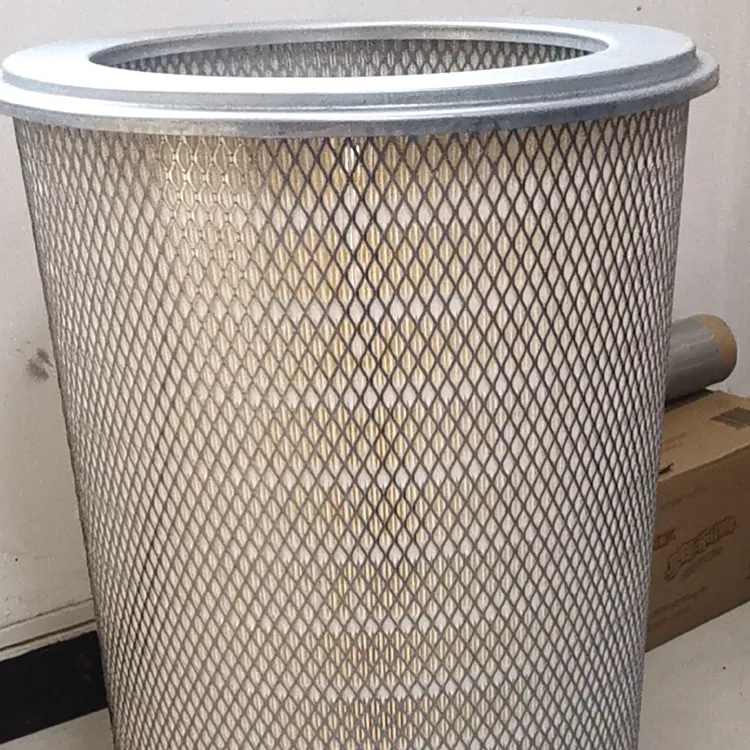 Tel:
+8618931101301
Tel:
+8618931101301
Jul . 04, 2025 10:00 Back to list
Sintered SS Filter Cartridges – Durable & High-Efficiency Filtration Solutions
and market overview

(sintered ss filter cartridges)
Introduction to sintered ss filter cartridges: Industry Growth & Key Features
Sintered ss filter cartridges have become a cornerstone in high-performance filtration across multiple industries. The global filtration market is anticipated to reach USD 98 billion by 2030, with sintered metal solutions experiencing a compounded annual growth rate exceeding 7%, indicating their rising preference. These filters, crafted through advanced sintering processes, offer unmatched chemical compatibility, high temperature and pressure resistance, and robust mechanical strength. With up to 99.9% particulate removal efficiency down to sub-micron levels, sintered stainless steel filters consistently outperform conventional woven or pleated filter elements, translating into reduced operational costs and extended service life for industrial operators.
- Filtration Ratings: From 0.2 µm to 100 µm granularity.
- Particle Removal Efficiency: Certified up to 99.99%.
- Temperature Endurance: Stable from –200°C to +550°C.
- Typical Applications: Petrochemical, food & beverage, pharmaceutical, water treatment, and gas filtration.
Unlike traditional elements, sintered ss filter cartridges are inherently cleanable and back-washable, supporting multiple cycles and reducing waste. Their modular formats cater to custom integration, addressing specific demands in process industries where contamination control equals critical reliability.
Technological Advancements in Sintered Metal Filter Cartridge Manufacturing
The evolution of sintered metal filter cartridge technology hinges on continuous R&D and process innovation. Modern sintering now utilizes fine 316L and 304L stainless steel powders and advanced isostatic pressing, producing filter media with highly controlled pore size and interconnected porosity. This uniformity supports superior laminar flow, minimal pressure drops (as low as 10–40 mbar), and long-term structural integrity even in aggressive process environments.
Developments in multi-layer sintering permit differential filtration gradients – combining coarse and fine layers within a single cartridge. Furthermore, sintered ss filter cartridges often undergo surface treatments—electropolishing, passivation, or PTFE coating—enhancing fouling resistance and expanding applicability in ultra-pure water or corrosive gas systems.
- Automated laser inspection and permeability testing standardize QC metrics, yielding rejection rates below 1%.
- Cartridges now support customized geometries (conical, cylindrical, disc formats) scaling from lab-scale modules to industrial housings over 60 inches in length.
These advances translate directly to operational value, maximizing uptime and safeguarding product quality in sectors where contamination is not an option.
Comparing Leading Manufacturers: Performance & Specification Analysis
Selecting a sintered metal filter cartridge supplier impacts filtration efficacy, sustainability, and cost of ownership. Below, a comparative analysis of prominent global manufacturers is presented, highlighting ss sintered filter product lines, technical parameters, and value-added services.
| Manufacturer | Model | Material Grade | Micron Rating (μm) | Max. Temperature (°C) | Flow Rate (L/min at 2 bar) | Reusability Cycles | Certifications |
|---|---|---|---|---|---|---|---|
| PorousMet Global | PM-SinterMax 100 | 316L SS | 1–50 | 520 | 230 | 100+ | FDA, ISO9001, ATEX |
| Filtra-Tech | FTS-Sinter Ultra | 304L SS | 0.5–30 | 480 | 180 | 80+ | CE, RoHS, ISO14001 |
| Metafilter Solutions | MetaPure 3000 | 316 SS/PTFE | 0.2–40 | 550 | 305 | 120+ | FDA, SGS, EU1935/2004 |
| Sinox Process | SP-SinterPro | 316L SS | 1–20 | 520 | 195 | 90+ | EN10204, REACH, NSF |
When evaluating suppliers, scrutinize traceability, technical support, customization scope, and post-sales services. Some provide rapid prototyping for unique requirements, while others excel in volume scale-up and supply chain reliability.
Customization Options and Solution Design for ss sintered filter Systems
Every filtration application demands unique material and process compatibility. Leading manufacturers respond by offering an extensive menu of customizations in ss sintered filter solutions:
- Custom pore size distribution and multi-grade gradients for staged filtration
- Special alloys (Hastelloy, Inconel, titanium blends) for high-corrosion environments
- Sanitary surface finishes for FDA and pharmaceutical compliance
- Innovative end-cap connections (DOE, 222 O-ring, NPT, flanged) for integration flexibility
- Bespoke cartridge lengths, diameters, and pleat configurations
- Hybrid assemblies combining sintered metal depth media and pleated prefilters
Collaborative design engineering is often available, integrating 3D CAD modeling, flow simulations, and small-batch prototyping to optimize system performance before full-scale deployment. This tailored approach solves legacy process bottlenecks, improves throughput, and extends the useful life of both filter elements and downstream assets.
Diverse Applications: Real-World Use Cases and Case Studies
The industrial footprint of sintered ss filter cartridges spans mission-critical processes, from precision food filtration to hazardous chemical handling.
- Pharmaceuticals: Supporting sterile air and ultra-clean water systems, sintered metal cartridges reduce bioburden and endotoxin loads to below 0.05 EU/mL in injectable preparations.
- Chemical Processing: Enabling safe acid/solvent filtration with documented lifespans exceeding 5 years under continuous service.
- Oil & Gas: Inline solids removal at gas dehydration facilities, sustaining flow rates of 280+ L/min and pressure resistance to 100 bar.
- Power Generation: Used in condensate polishing, maintaining SDI (Silt Density Index) values below 3 and protecting turbines from fouling damage.
Case Study: Leading Dairy Producer — Implementation of multi-layer ss sintered filter cartridges increased milk shelf life and decreased annual filter change-outs by 85%, netting operational savings of $150,000.
Case Study: Semiconductor Facility — PTFE-bonded sintered cartridges delivered sub-0.5 µm particle control in process gases, reducing defect rates and boosting batch yield by 13% over legacy filters.
Integration Considerations: Installation, Maintenance, and Efficiency
For optimal performance, sintered metal filter cartridge installation and management should account for system pressure, fluid compatibility, and cleaning protocols. Proper sizing involves matching porosity and open-area ratios to process flow rates and anticipated contaminant loads.
- Installation Best Practices: Ensure correct orientation, gasket sealing, and loading torque to prevent bypass.
- Backwashing & Cleaning: Sintered filters support CIP (Clean-in-Place), high-temperature steam sterilization, and ultrasonic descaling, cutting maintenance labor by 30–50% versus alternatives.
- Lifecycle Cost Advantage: Data shows sintered ss filter cartridges lower total annualized filtration spend by an average of 40%, driven by extended reusability and drop-in replacement design.
Periodic integrity testing—bubble point and pressure decay—is standard to assure continued removal performance. These practices guard long-term system reliability and process compliance.
Conclusion: Why Sintered ss filter cartridges are a Game Changer
The adoption of sintered ss filter cartridges is fundamentally transforming modern industry filtration, driven by a unique convergence of efficiency, durability, and adaptability. Their ability to deliver ultrapure fluid handling at high temperatures and aggressive chemical exposures—backed by data-driven performance and customization—offers manufacturers a path to consistent quality, regulatory conformance, and sustainable operations. As industries continue to demand higher productivity and lower environmental impact, sintered metal filters will remain at the forefront, supporting both innovation and responsible progress in global filtration engineering.

(sintered ss filter cartridges)
FAQS on sintered ss filter cartridges
Q: What are sintered SS filter cartridges?
A: Sintered SS filter cartridges are filtration elements made by sintering stainless steel powder or fibers into a rigid, porous structure. They provide excellent mechanical strength and chemical resistance. These cartridges are ideal for high-temperature and corrosive filtration applications.Q: What is the main advantage of a sintered metal filter cartridge?
A: Sintered metal filter cartridges offer exceptional durability and can be cleaned and reused multiple times. Their uniform pore structure ensures reliable filtration efficiency. This makes them cost-effective for industrial use.Q: How does an SS sintered filter differ from a traditional filter?
A: An SS sintered filter has a robust, weldless metal construction, unlike traditional filters that use organic or synthetic fibers. It resists corrosion and high temperatures. Additionally, it provides consistent filtration with longer service life.Q: In which industries are sintered SS filter cartridges commonly used?
A: Sintered SS filter cartridges are widely used in chemical processing, food and beverage, pharmaceuticals, and gas filtration. Their strength and purity make them suitable for critical filtration tasks. They also perform well in high-pressure environments.Q: How do you clean a sintered metal filter cartridge?
A: Sintered metal filter cartridges can be cleaned by backflushing, ultrasonic cleaning, or chemical soaking. This reusability extends their operational lifespan significantly. Always follow manufacturer guidelines for the best cleaning method.-
Smart Filtration with Advanced Dust Cartridge TechnologyNewsJul.21,2025
-
Reliable Air Protection from Leading Gas Turbine Filter ManufacturersNewsJul.21,2025
-
Premium Air Filtration Solutions with Advanced Air Filter Cartridge TechnologyNewsJul.21,2025
-
Optimizing Industrial Air Quality with Dust Collector Filter CartridgeNewsJul.21,2025
-
Industrial Air Quality Enhancement with Advanced Filter CartridgeNewsJul.21,2025
-
High-Efficiency Protection with Advanced Gas Turbine FiltersNewsJul.21,2025

 Email:
Email:





